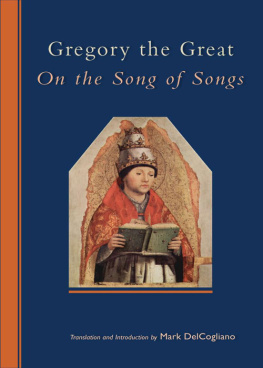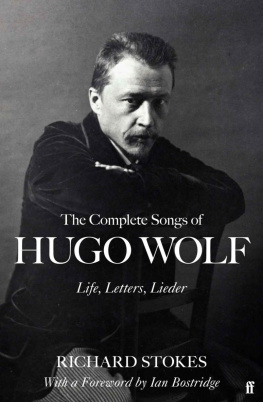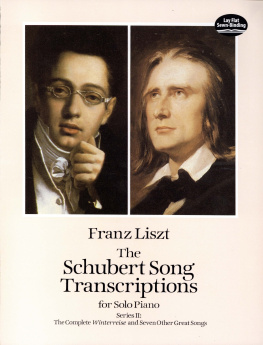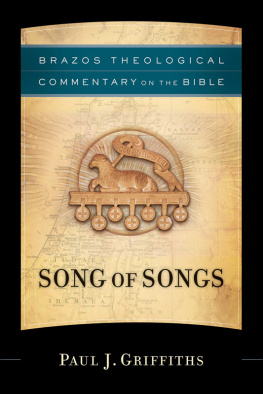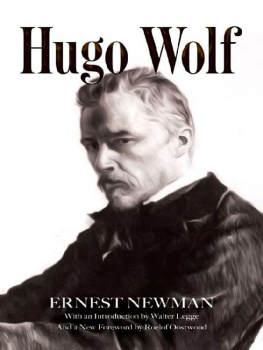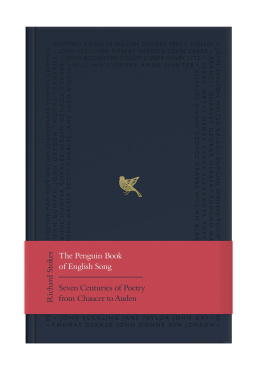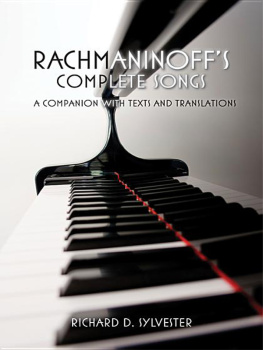Preface
to the First Edition (1961)
This book discusses all the 242 songs written for voice and piano published in the composers lifetime, i.e. the contents of the invaluable Peters Edition in twenty-one octavo volumes.
In writing about each song I have tried to translate the German words, to comment on the music in general terms, and to add notes on points of detail. A word or two of explanation may be needed on each of these aims.
Some of the German texts are great poetry, some have no particular merit; some are long, others only a few lines. In some, individual words or phrases are important; in others, only the general mood matters. Accordingly the method of treatment varies. Sometimes it is a literal translation, sometimes a summary, sometimes a paraphrase; sometimes a mixture of all or some of these things. But the aim is always the same to render in English prose the essence of the words as they appear in Wolfs music.
In the commentaries I try to describe each song, and, so far as possible in so brief a compass, to show the interconnection between the music and the poem. Inevitably, in so doing, I have also become involved in some attempt at evaluating the intentions and achievements of the songs. To describe music in words is already a difficult task, and the procedure adopted may well also involve a lack of proportion. For instance, there is little to say about some of the finest songs except that they are admirable, while others, less fine, may contain many points that can more helpfully be dealt with by verbal comment. In the last resort these commentaries are simply personal impressions of the songs, evaluated from their effect on one listener who has known them all, and loved most of them, for a long time.
The notes are mainly intended to illuminate various aspects of Wolfs musical language (to use his own phrase). This topic sometimes raises technical points, and here textual references are included.
In the main, then, what follows is a series of separate discussions of particular songs. But one cannot altogether avoid generalization. So the opening chapter attempts a general account of Wolfs song-writing.
I have made no attempt at any serious consideration of Wolfs own personality and the tragic story of his life, important though these matters are to a proper understanding of his music. They have been definitively dealt with in Frank Walkers masterly biography Hugo Wolf , which should be read by everyone who is interested in Wolfs life and work.
Lastly, I would express my gratitude to all those who have helped me.
I am indebted to Max Hinrichsen for permission to quote and refer to the Peters Edition of Wolfs songs, and for his personal kindness to me.
To Robert Moberly I am grateful not only for the help he gave me by reading and commenting on the text in detail, but for his unfailing understanding and encouragement; and to David Mowatt also for his valuable assistance in critical comment.
Dent, 1951 [revised and enlarged 2nd ed., 1968]
Preface to the Second Edition
The aims of this book remain unchanged; but the text has been very substantially revised and enlarged. For practical reasons the main sequence of subject matter remains centred on those 242 songs for voice and piano, in the same chronological order and numbering as before, that Wolf himself adjudged worthy of publication. For this new edition, however, I have added the three Ibsen songs composed by Wolf for voice and orchestra and published by him in his own piano arrangement.
The introductory essay on Wolf as a song-writer has been revised to include much new material; here I have drawn (by kind permission of Macmillan) on my articles Hugo Wolf and The Romantic Lied in the New Grove Dictionary of Music and Musicians students, and here some knowledge of German is assumed. As a general rule, the notes begin with any textual points (including variant readings in current editions) and end with a reference to other major settings of the same words: here the many amplifications include some fifty further musical parallels between Wolf and his great predecessors and contemporaries, notably Schumann and Wagner. Finally the introductions to each of the major songbooks, together with the relevant commentaries and notes, have been expanded to include further background information about the poets and their sources. Here again I am obliged to Macmillan for permission to draw on my New Grove article on Mrike.






